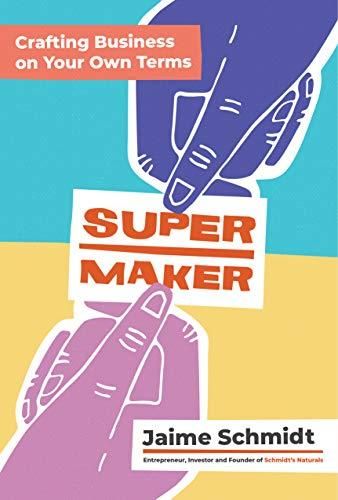Jaime Schmidt, founder of Schmidt’s Naturals, details her journey from making products in her bathtub to selling her blockbuster company to Unilever. She writes with wit, warmth and self-deprecation.

Warm, Worthy Advice
Jaime Schmidt, founder of Schmidt’s Naturals, spent countless hours creating a formula for a natural deodorant. She relates first selling her product locally and then building her small company into a runaway success. Schmidt’s decision to sell her company to Unilever in 2017 allowed her to focus on helping others.
Schmidt writes in an endearing, personal, natural voice. Her purpose is twofold: to inspire other independent entrepreneurs and to spare them the difficulties she faced. And while she markets her book with emphasis on her business advice, readers are likely to connect more strongly to her personal saga.
She’s won wide praise for Supermaker. Paul Polman, the former CEO of Unilever said, “Jaime’s story of founding Schmidt’s from her kitchen and growing it into a global brand is one for the ages.” Ancillary books include Mind Your Business by Ilana Griffo and Ken Colwell’s Starting a Business QuickStart Guide.
Natural Body Care
In 2010, Schmidt watched an online “DIY shampoo” class that awakened her passion. She made soap, shampoo and lotions, following recipes from books, then using her own designs. She entered Portland, Oregon’s “Maker Movement,” selling her wares at local stores, street fairs and farmers markets. Schmidt created a Facebook community, posting recipes and article links. She divulges that when she first sold through her online store on Etsy, she sent a handwritten note with each order.
Relationships First
As her company grew, Schmidt updated her packaging, scheduled promotional events, and built strong relationships with area stores and the customers she met at events.
I was cultivating a personal brand – and that created trust, which led to more opportunities.Jane Schmidt
Schmidt believes entrepreneurs must prioritize product quality over social media or sales. She advises bartering with a graphic designer to get a properly attractive label, staying conscious of legal issues and letting customer feedback guide you. Schmidt set wholesale prices and learned how to use barcodes. She established virtual and real-world communities.
Professional Rebranding
Schmidt takes readers through each step of her process with care. She wants to share the lessons she learned and to ease readers’ paths in their own businesses. Schmidt rebranded to concentrate on deodorant and produced several blended scents. Her website listed stores that carried her deodorant. Schmidt confesses one effective tactic: she leveraged one retail account to land another. She also met with buyers at trade shows.
Her deodorants sold in the Pacific Northwest and on the West Coast. She refers to her shock and outrage when rival brands with containers identical to hers appeared on social media. Schmidt advises that she never shared her formula, process, suppliers or marketing techniques. And she recommends following her lead and trademarking your brand name, logo, marketing text and design. If a competitor infringed, she sent a cease and desist letter.
Success after Tough Lessons
Schmidt rues having to learn some tough lessons. For example, a prominent brand questioned the scientific veracity of some of her product claims. Schmidt reports learning that asserting that her deodorant could “outlast the competition” required a research study. Schmidt also explains that she withdrew from a retailer after discovering the owner’s had discriminatory views about gays, and she decided not to sell at a huge Chinese market because it required cosmetics to use animal testing.
In 2013, her business boomed. Schmidt is proud that by year’s end, the company made $132,000 in sales of products, increased its number of scents, moved to a small manufacturing space, updated its sales materials and hired more people to manufacture deodorants. In more good news, Schmidt reveals, her products were bestsellers at Whole Foods.
Someone passed her deodorant along to actress Alicia Silverstone, who endorsed it in US Weekly. Schmidt exults that online sales then soared to 500 units – more than a month’s usual sales. She refers with happiness to the TV show Portlandia mentioning her label in a skit and naming the brand in its blog post. Schmidt writes with affection of how online sales increased dramatically under the guidance of her husband Chris. By the end of 2016, her deodorant was being sold in Target and Walmart.
A 350% Increase
Schmidt used national media coverage, advertising on social media and sales on Amazon to generate profits. Between 2015 and 2016, the company increased revenue by 350% to $6.9 million and employed 100 people.
The pace of growth was relentless…each new accomplishment provided fresh motivation to keep going.Jane Schmidt
Schmidt changed the firm’s name from Schmidt’s Deodorant to Schmidt’s Naturals in 2017. She cautions readers to follow her example in protecting their inventions and intellectual property: She sent her manufacturing plant pre-mixed powders and oils to protect her proprietary formula. Schmidt’s Naturals opened an office in Florida and outsourced its finance operations.
“Spasmodic Dysphonia”
Schmidt bravely discusses how she suffered a vocal condition called “spasmodic dysphonia” that frustrated and upset her, but did not deter her from her entrepreneurial path. Finally, Botox treatments eased her symptoms and enabled her to pitch major retailers with confidence. She remains dependent on the injections.
Target and Unilever
Schmidt tells some good corporate war stories, including her break down of how Schmidt’s Naturals’ unexpectedly huge sales at Target upended its reordering system, since Target often left her shelf space empty.
What had begun as making was now manufacturing.Jane Schmidt
Schmidt recalls the joyful day that Unilever purchased her company. The nine-figure deal exceeded her “wildest dreams.” In 2018, she and Chris started an investment fund called Color. Its mission, Schmidt stresses, is to support “underrepresented founders.” The workshop launched its website, Supermaker.com to promote “modern workplace thinking.”
Positive Focus
It is impossible to dislike Jane Schmidt or to root against her success. While she provides workable, practical, empathetic advice to would-be or beginner entrepreneurs, Schmidt grounds her memoir in her vulnerability, hard-earned business education, optimism, perseverance and unshakeable humanity. While she could have decided to go into greater detail about a business partner who proved somewhat shady, Schmidt did not. There is not one word of self-importance in this tale. She vests in her mistakes so you won’t make them. This brave stance fueled Schmidt’s success. She generously shares credit and chooses to focus on the positive.









